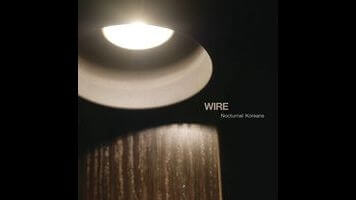Wire uses studio trickery to magnificent effect on Nocturnal Koreans

The eight songs on Wire’s Nocturnal Koreans emerged from the same studio sessions that produced the band’s last full-length, 2015’s bracing WIRE. However, vocalist-guitarist Colin Newman makes it very clear that these are no mere leftovers: Instead, songs ended up the raw material for intensive studio sculpting that was creatively rejuvenating for the post-punk legends. “A general rule for this record was: any trickery is fair game, if it makes it sound better,” Newman said in Nocturnal Koreans’ official biography. However, as per usual, Wire took an economical approach to this manipulation and experimentation, which ended up leading to taut, compact songs with distinctive approaches and inspirations.
Both “Dead Weight” and “Pilgrim Trade” are spry space rock, although the former has a lilting psychedelic sheen that’s vaguely mystical, and the latter has a grungy edge that conjures Failure. The title track is a snapshot of throttling, guitar-driven ’80s post-punk à la The Church or The Chameleons, while the very next song, “Internal Exile,” is a panoramic, keyboard-stacked waltz augmented by distorted lap-steel guitar and trumpet. In fact, the push and pull between lush instrumental textures and Wire’s inherent sonic antagonism is particularly effective on Nocturnal Koreans. Highlight “Numbered,” for example, starts off with self-referential, stinging guitar chords and lyrics (“You think I’m a number / Still waiting to rumba”), before dropping the deliberate retro pose and softening its stance to instead emphasize cascading synth waterfalls.
Yet when Nocturnal Koreans relaxes this tension, the results might be even better. “Still” is driven by watery major-key guitar chords—Newman also notes he was indeed thinking of 154’s “Map Ref. 41°N 93°W,” an obvious sonic and spiritual antecedent—which gives it a crisp, metallic-pop direction. And “Forward Position” has no drums at all: It’s a glacial, ambient-prog sprawl, with hesitant acoustic guitars and Newman’s conspiratorial, slightly paranoid voice doling out harsh realities and disappointments with barely concealed wariness. The record ends with the mesmerizing “Fishes Bones,” which features bassist-vocalist Graham Lewis muttering non sequiturs, as the rest of the band stacks sounds around him: clattering rhythms, hollowed-out electric guitar slashes, and abstract sound samples and effects. The song always teeters on the edge of imploding, but never quite falls apart—a marvel of both Wire’s internal chemistry and the meticulous approach to the record. Fifteen albums into its career, the band has never sounded more ready to rip up its playbook and forge ahead into new territory.